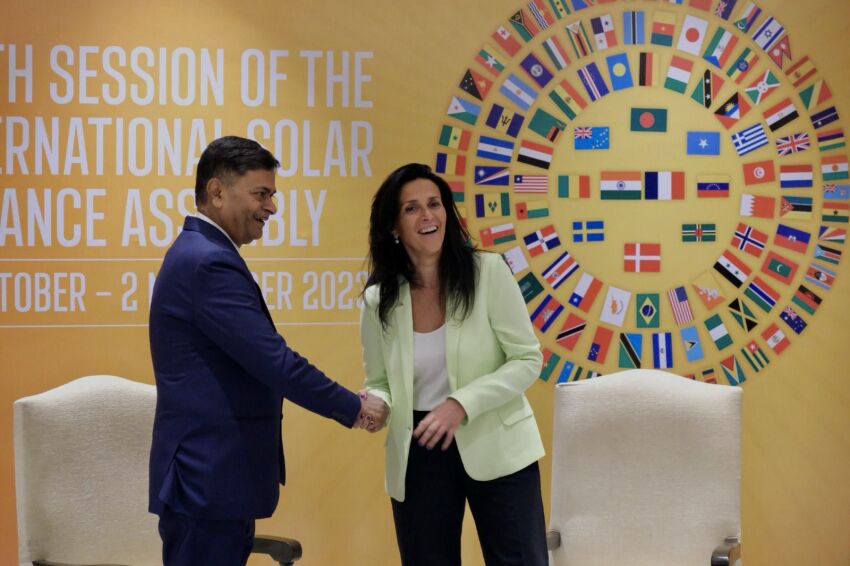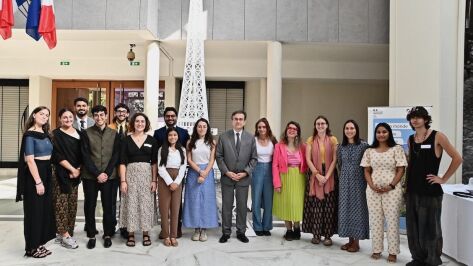 News
News 
visit-of-chrysoula-zacharopoulou-to-india
H.E. Ms Chrysoula Zacharopoulou, French Minister of State for Development, Francophonie and International Partnerships visits India to co-chair the Sixth Assembly of the International Solar Alliance, advance the Indo-French Partnership for the Planet, and promote Francophonie.
The Minister of State for Development, Francophonie and International Partnerships of France, H.E. Ms Chrysoula Zacharopoulou, was in India from 31 October to 1 November 2023 on the occasion of the Sixth Assembly of the International Solar Alliance, which she co-chaired with Shri R.K Singh, Hon’ble Minister of Power, and New and Renewable Energy of India. This was Minister Zacharopoulou’s third official visit to India, after co-chairing the previous ISA Assembly in October 2022, and attending the G20 Development Ministers’ Meeting in June 2023.
Minister Zacharopoulou’s visit aimed to advance the Indo-French Partnership for the Planet, one of the three pillars of “Roadmap 2047” set out by the leaders of France and India when Prime Minister Narendra Modi visited Paris to attend France’s Bastille Day celebrations on 14 July as Guest of Honour. Its spirit resonates with India’s vision of Vasudhaiva Kutumbakam, highlighted during the G20 Delhi Summit. Its goal is to provide concrete solutions to global challenges by uniting our partners and advancing cohesion against the risks of fragmentation of the world.
This vision had inspired the establishment of the International Solar Alliance (ISA), an Indo-French initiative launched in 2018, which today counts 94 member States. Minister Zacharopoulou co-chaired its Sixth Assembly, highlighting the key role of ISA in meeting our climate and renewable energy goals, and raise the level of ambition ahead of the upcoming COP28. She also held a bilateral meeting with Minister R K Singh to discuss cooperation on accelerating energy transition as well as ISA’s France-funded STAR-C project.
In the same spirit, Minister Zacharopoulou’s visit also focused on the Paris Agenda for People and the Planet, which was adopted in Paris in June 2023 at an international Summit co-prepared with India. Its purpose is to ensure that no country has to choose between fighting poverty and fighting for the planet, by ensuring that financial investments converge where people and planet need it most. This topic featured in Minister Zacharopoulou’s meeting with Smt. Meenakshi Lekhi, Hon’ble Minister of State for External Affairs, and Culture. In addition, the two ministers discussed cooperation on Francophonie, museums, and heritage, France and India having decided to work together for India’s ambitious National Museum project.
Lastly, Minister Zacharopoulou aimed to promote French language learning in India. French is already the most learned foreign language in India, with 600 000 learners. Minister Zacharopoulou visited the Alliance française de Delhi, one of the 15 Alliances françaises across the country, which together represent France’s most active network in the world in terms of French teaching hours. The French Minister interacted with students of the Alliance, sharing her personal story of learning French at an Alliance française, and presenting the goals of the Francophonie Summit that France will host for the first time next year.
Inauguration of the 6th International Solar Alliance Assembly - Speech by H.E. Ms Chrysoula Zacharopoulou
=== Check against delivery ===
Honourable Minister of Power, and New and Renewable Energy,
Honourable Ministers,
Director General of the International Solar Alliance,
Ambassadors,
Dear friends,
I’m delighted to be here today to co-chair our Assembly with the Hon’ble Minister, Shri R. K. Singh.
Minister, on July 14th, the President of the French Republic Emmanuel Macron had the pleasure of welcoming Prime Minister Narendra Modi as Guest of Honour of our National Day, and celebrating 25 years of strategic partnership between India and France. We also set out our roadmap for the next 25 years: global challenges are and will remain at the heart of this partnership. We look forward to continuing to work together.
The International Solar Alliance - even though it was born in Paris as part of COP21, and was the first international organization established in India - is much more than a bridge between India and France.
It’s a truly multilateral project that brings together all the players involved in facing the greatest challenge of our time.
1. For France, the Solar Alliance is a key initiative to promote the development of clean energy and thus combat climate disruptions.
The Solar Alliance has grown a lot since 2015. I’m proud to see new members joining us every year. We’re approaching the 120-member-state mark! What a wonderful momentum!
I’m glad to see our programmes thriving, particularly in capacity building.
France is playing its full part in this great project, with constant and growing support for our Alliance:
- Through the French Development Agency (AFD), we’ve financed over 1.5 billion euros worth of solar projects since 2016.
- And today I’m pleased to announce, Director General, Dear Ajay, that a French expert is joining the Alliance Secretariat to strengthen our support for your work.
2. Ladies and gentlemen, the geopolitical and the global energy contexts have changed radically since our Alliance was launched in 2015.
And this has consequences for the direction we need to give to our organization. In 2015, when the Alliance was founded, the aim was to support the growth of solar energy, lower costs, and convince people of the relevance of this technology.
8 years later, two trends have overtaken this original mission:
1) On the one hand, we have entered a state of climate emergency more than ever before.
Climate catastrophes are multiplying, from the Himalayas to the Sahel, from the Mediterranean basin to Australia.
With COP28 just around the corner, it’s vital that we step up our efforts on all fronts to meet the objectives of the 2030 Agenda for Sustainable Development and at the same time those of the Paris Agreement.
At the COP, one of France’s priorities will be to support all commitments - particularly financial - to accelerate the global energy transition.
2) On the other hand, the solar revolution is underway, and is set to accelerate drastically over the coming years.
The new figures from the International Energy Agency (IEA) are striking.
- Year after year, the solar power boom beats the most optimistic forecasts.
- At the time we founded our Alliance, the IEA predicted just 1,400 gigawatts of solar power by 2050, but we surpassed that mark as early as 2023!
- And between 2022 and 2023, the Agency has raised its outlook for 2050 by +69%!
- In 2022, it predicted barely 5,000 gigawatts of solar power. It now predicts over 12,000 gigawatts of solar energy by the middle of this century!
So the challenge for our organization is no longer to support the growth of solar energy. This boom is inevitable, and it’s already underway.
Today, our mission is to steer this momentum.
- Towards which countries?
- For the benefit of which populations?
- How can we contribute to achieving the Sustainable Development Goals (SDGs)?
I see three challenges:
1) The first challenge, in my opinion, is to accelerate the deployment of solar energy in major markets such as Europe and India, in order to structure a truly global ecosystem.
Europe and France remain deeply committed to implementing this solar transition on our territory.
- By 2030, we intend to increase the share of renewable energy in the EU’s energy consumption to over 42%.
- In France, our ecological plan calls for doubling the rate of solar capacity installation.
And I know that in India, this revolution is also underway.
2) The second major challenge is to ensure that investment in solar energy is equitably distributed and also benefits developing countries, from Africa to the Middle East and South-East Asia.
Unfortunately, the solar revolution I’ve described is not benefiting everyone. It’s not bearing fruit everywhere at the same speed.
The African continent possesses 60% of the world’s solar potential, but only 1% of installed solar capacity. It is this great injustice that our Alliance must tackle.
France is taking action. And we are determined to accelerate:
- Last year, we provided over 7.5 billion euros in climate finance to our partners. These are not mere figures, but concrete projects, such as the construction of the Onigbolo solar power plant in Benin, which we completed this year, bringing 25 megawatts of clean energy to the people of Benin.
- We also support our partners in formulating and financing their fair energy transition plans. This is the founding principle of all our international partnerships: to be based on national agendas and priorities. In this respect, I would like to pay tribute to the commitment of the Senegalese authorities. Together with Germany, we have signed a historic "Just Energy Transition Partnership" that will increase the share of renewable energy in Senegal’s electricity mix to 40% by 2030, in return for 2.5 billion euros in funding from donors, including France.
And Senegal is not the only country: we have also signed JETPs with South Africa, Vietnam, and Indonesia.
I would also like to remind you that the solar revolution must be backed up by a broader strategy of access to energy. Again, in Senegal, we are contributing 72 million euros with the European Investment Bank and the EU to connect 270,000 households and businesses to the electricity grid.
- Above all, we want to work together to improve access to financing.
Billions of euros from France and other donors won’t solve the problem. We need to reform the international financial architecture so that it meets the challenges of the 21st century, and in particular, the energy transition challenge. In particular, we need to ensure that private investment in renewable energies is leveraged to flow to developing countries.
This is the aim of the Paris Agenda for People and the Planet, which nearly 40 countries have already joined, and which we will continue to support in the run-up to COP 28.
Its principles echo the agenda we are pursuing at the Solar Alliance through the Sustainable Renewables Risk Mitigation Initiative (SRMI). We have approved the second phase of this partnership between the Solar Alliance, several multilateral banks, and development agencies. 160 million dollars from the Green Fund will be combined with 960 million dollars from the World Bank to mobilize 1.8 billion dollars in private investment in nine countries, including Tunisia, Ethiopia, the Seychelles, and Somalia.
It will enable the deployment of over 2 gigawatts of new projects, benefiting 3 million people.
The objective is clear: to reconcile economic development and ecological transition. In other words, to reconcile the planet with its peoples. This was a key priority of the Indian presidency of the G20, so let’s continue with a concrete ambition.
3) The last challenge and France’s last priority for the Solar Alliance is people.
The solar revolution isn’t just about billions in investment and silicon panels.
The solar revolution also includes:
- engineers,
- technicians,
- training centres
- and the creation of genuine scientific, technological and entrepreneurial ecosystems.
These elements are crucial to strengthening the absorptive capacity of countries. This is the best investment we can make.
The Solar Alliance plays a key role in capacity building: through the STAR-C programme we aim to strengthen a solid network of centres of expertise, to standardize training, have uniform technological standards and ensure that the solar revolution contributes to local employment. France’s contribution to the STAR-C programme supports regional centres of expertise in three pilot countries: Senegal, Papua New Guinea, and Bhutan.
***
Ladies and gentlemen, at a time when international tensions seem to be growing more acute by the day, I would like to conclude with a conviction that is dear to me:
I sincerely believe that this Alliance has the capacity to provide solutions to one of the great challenges of our time, despite the fractures in the world.
It is in such spaces that we can truly transform the world. As President Ruto of Kenya often says, in the face of climate change, it’s an impasse to oppose an imaginary "Global South" to a so-called "Global North". It’s cooperation between us all that will enable us to face the challenge.
When it comes to global challenges, the only distinction that exists is between champions who act, and laggards who block collective progress.
It’s up to us to prove together that the International Solar Alliance is a force for progress.
COP28 will be a decisive test for the Alliance and for each of its members.
You can count on France, and I know I can count on you.
Thank you./.
India to France: Solar solutions for the planet (Joint opinion piece in Hindustan Times by RK Singh and Chrysoula Zacharopoulou)
India to France: Solar solutions for the planet
On solar energy just like on other global issues, the focus of the Indo-French strategic partnership is on scaling up solutions.
The urgency of the climate crisis cannot be overstated. We stand at a pivotal moment in history, teetering on the edge of dramatic irreversible consequences. At the 2015 Paris COP21, the world entered into a new compact to address the climate crisis: India and France announced the creation of the International Solar Alliance (ISA) to promote this key resource to help the world move away from fossil fuels.
In 2023, the Paris Pact for People and the Planet and the G20 Delhi Declaration signalled that no country should have to choose between eradicating extreme poverty and tackling the climate crisis. Leaders recognised the importance of tailoring development and climate strategies to each nation’s unique circumstances, backed by a commitment of an additional $200 billion from multilateral development banks. This is pledged to accelerate a just transition towards clean energy models.
At the heart of this shift to meet net-zero targets is solar energy. A majority of the world recognises that this source of power will carry us to the future we want – sustainability based on a low-carbon economy and affordable energy for all. With investments surpassing $300 billion and accounting for over 11% of global energy investments, the potential of solar PV energy is staggering. However, these investments remain concentrated in specific regions, leaving vast untapped solar potential in emerging and developing regions. To expedite progress, we must prioritise equitable distribution of resources.
A significant hindrance to solar expansion is upfront investment costs. Low- and middle-income countries face a crucial challenge in obtaining affordable financing. This leaves them trapped in a cascade of costly payments for fossil fuels.
The Paris Summit for a New Global Financing Pact stated: “Explore all the ways and means to mobilise and increase financial resources, including from the private sector, to unleash this potential for all.” The public-private approach can reduce costs and make renewable projects financially viable. In the Maldives, a World Bank financial mechanism enabled project costs to drop from 15 to 9.8 cents per kilowatt-hour. This breakthrough against default risks and currency fluctuations garnered interest from investors, offering one of the lowest costs for electricity in the small island developing States. A substantial boost in this type of financing, coupled with risk underwriting, is essential to unlock the private investment surge we need, especially in Africa.
Africa currently accounts for only 1.3% of the world’s installed solar capacity. With nearly 600 million people in Africa lacking access to electricity, the case for distributed solar is compelling. It offers a path to energy independence and reduces reliance on fossil fuels. Furthermore, the cost of solar PV energy is now competitive: At $24/MWh, it is lower than that of either coal or natural gas. The dramatic decrease in solar module costs over the past decade highlights the all-round benefit of investing in solar energy including jobs generation — in 2022, the solar PV industry employed 4.9 million workers, with a remarkable 40% full-time positions for women.
There are many other challenges on top of this financial question: Institutional and technical capacities in solar projects, for example, which is being addressed by the ISA through its partnership with the United Nations Industrial Development Organisation setting up STAR Centres with the financial support of the French government.
But it all comes down the same road. To put the energy sector on a pathway to limit warming to +1.5°C, we must triple the global renewable energy capacity by 2030. Therefore, the way forward requires a substantial increase in investments, and partnerships among governments, the private sector, and financial institutions through a clear political commitment. India and France, as chair and co-chair of the ISA, are determined to achieve this.
On solar energy just like on other global issues, the focus of the Indo-French strategic partnership is on scaling up solutions. President Emmanuel Macron and Prime Minister Narendra Modi highlighted this ambition when they met in Paris in July 2023. In a world of rising international tensions, where fragmentation risk can imperil our collective efforts to protect the people and the planet, France and India will keep joining forces for progress.
RK Singh, Union minister of power and new & renewable energy, is president and Chrysoula Zacharopoulou, minister of state for development, francophonie and international partnerships, France, co-president of the International Solar Alliance. The views expressed are personal.
The opinion piece was published in Hindustan Times on 1st November 2023.






Comments
Vous devez être connecté pour laisser un commentaire. Log in